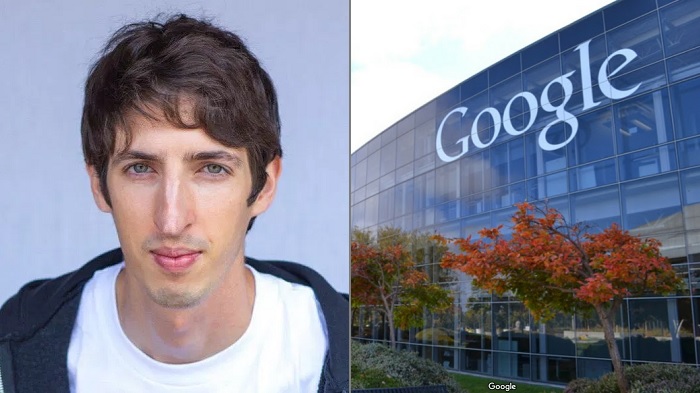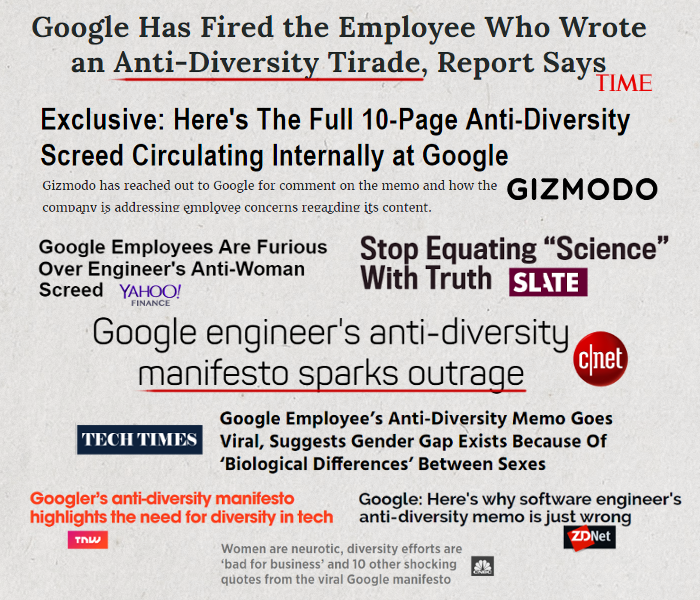The James Damore Google diversity memo and the media's deranged response

The job of those of us who contend with the mainstream news media, claiming bias and questioning its integrity, is more difficult than you'd think. Much of the evidence we have to go on is minute, only adding up to anything in aggregate, or difficult to prove (e.g. things like double standards). With armies of researchers and fact-checkers at its disposal the media tends to be a fairly reliable source of basic information at least. Thankfully, James Damore's memo on Google's diversity initiatives and the response that followed made for a rare gift: an incredible all-in-one example of everything that's wrong with the media.
This story has it all: the media exposing its dreadfully poor understanding of the state of scientific opinion (and consequently its grasp of reality in general); its nasty character on display, in its attempt to smear and destroy someone for contradicting it (correctly) on one of its favorite causes; and its hive mind mentality, with there being only a handful of mainstream voices willing to break with their colleagues and offer anything apart from scathing denunciations of the man.
As he tells the story, Damore decided to write a memo critical of Google's diversity initiatives and post it on their internal messaging service after going to one of the company's presentations on the matter. News of the memo was leaked to Vice's Motherboard and they posted a story about an “anti-diversity manifesto” that had gone viral at Google. This was followed by the document itself being leaked to Gizmodo, by which time the memo was already being ridiculously referred to as a “screed” – a word with highly and blatantly negative connotations that doesn't come close to describing its tone or nature. The story then went viral, with virtually all mainstream coverage being misleading and defamatory and totally wrong in its understanding of the science and facts at hand.

The hot issue behind the memo and its fallout is the gender gap in the tech industry: the large discrepancy between the numbers of men and women that make up its workforce. It's a point of dogma in liberal–progressive circles and the mainstream media that where these gaps exist they can only be artifacts of a less enlightened past (social constructs as they say) — it's certainly not owing to innate differences between people, so they think. The principle of egalitarianism, that we're all equally capable, is deeply important to liberalism and acknowledging any other explanation is unconscionable to a great many people. Judging by the response to Damore's memo, this is the dominant mindset at Google as well.
The distribution of preferences and abilities of men and women differ in part due to biological causes and these differences may explain why we don’t see equal representation of women in tech and leadership."
—James Damore
All that Damore argues in his memo is that the gender gap is at least in part explained by biological differences between men and women in preferences and abilities. The differences he lists are: women are more interested in people and men are more interested in things, as extroverts women express themselves more gregariously than assertively, women exhibit greater anxiety and less tolerance for stress, and men are far more driven by status than women.
Damore's careful to note that many of these differences are small and that there's significant overlap between male and female populations, but on average they will result in a gender gap. It makes no difference how the point is qualified, it's the heresy of heresies to say that there are not just physical but mental differences between the sexes. The former is obvious to all — if rarely stated openly to avoid offence — while the latter is one idea most people, in their reluctance to be socially regressive, have a harder time accepting.
So what does science have to say about these claims? It's overwhelmingly in Damore's favor (see here, here, and Stephen Pinker's The Blank Slate). Far from being a controversial matter, it's described as “[not being] up for debate” and something that “you'd be laughed at” for trying to argue. There's an immense body of evidence (as well as evolutionary biological reasoning as Pinker and others note) that there are substantial differences in the preferences of men and women, that we differ in a number of ways that may impact performance in STEM fields (e.g. spacial and mechanical reasoning), and that the greater variability and wider bell curve of traits in men will lead to their greater prominence at companies like Google that draw their employees from the uppermost tail of the population distribution.

In summary, the media reacted to a lowly engineer's constructive and fact-based criticisms of his company's ill-conceived efforts to increase the diversity of its workforce with a maelstrom of totally ignorant, libelous, idiotic, and scathing denunciations of his character and position. They did so simply because reality grievously undermines their worldview — on this point and others — and they can't give it up without a fight because to do so would be to admit that they're wrong about a great many things. What does that say about the relationship between the mainstream media and the public that they would do this? Why should we not see them as a hostile power; an enemy?
Remember the so-called conservative “War on Science”? Everything you've heard about “fake news and the “post-truth” Trump Administration? Well it turns out that the mainstream media has some serious problems peddling falsehoods and speaking truth too.
Revisions:
Minor rewrite for writing improvement (Sep 5, 2023)
